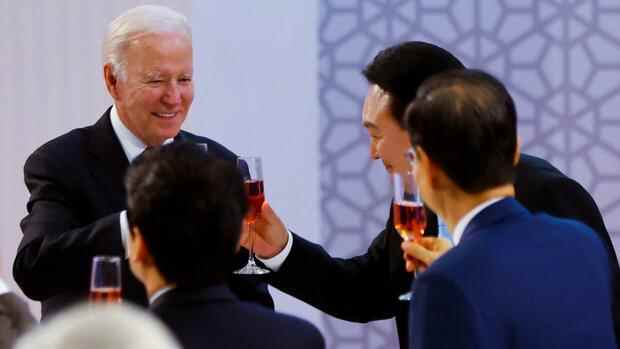Tokyo Joe Biden scored a success in South Korea on his first trip to Asia as US President: the new South Korean President Yoon Suk Yeol wants to strengthen the security alliance with the US and involve his country in Biden’s economic initiative in the Indo-Pacific. The program is called the Indo-Pacific Economic Framework (IPEF).
The initiative is important to Biden’s global strategy. The US President wants to curb China’s influence in Asia and make his country economically more secure. According to the US government, the two countries will cooperate more closely on a number of issues:
Biden plans to present further details of his Indo-Pacific economic initiative on Monday in Japan, his second visit destination.
President Yoon said Saturday that South Korea’s entry into the US initiative is about security policy. Economic security is also national security, Yoon said: “The change in the international trade order and the disruption of global supply chains have a direct impact on the livelihoods of our citizens.”
South Korea’s new president is more anti-China
By participating in the initiative and forming a technology alliance, conservative Yoon is deviating from the course of his left-wing predecessor, Moon Jae In. He tried to hold back in the conflict between the US allies and South Korea’s largest trading partner, China. He wanted to improve the relationship with the neighbors.
Yoon, on the other hand, is now clearly positioned on the side of the USA. He wants to stand up for democracy and rule-based trade more strongly in the region and globally. A stronger confrontation by China is also linked to these concerns. Both sides underlined how important it is for them to develop supply chains together.
Immediately after his arrival on Friday, Biden visited a Samsung chip factory. The group is investing 17 billion dollars in a plant in the USA. And that’s just part of a grand offensive. South Korean automaker Hyundai Motor announced on Saturday that it would build a $5.4 billion battery plant in the United States.
South Korea’s participation in Biden’s initiative is a risky foreign policy move. Korean foreign policy expert Lee Shin Wha, a professor at Korea University in Seoul, says: “We have to worry about a backlash from China.”
Beijing had already punished its small neighbor economically once before: when South Korea stationed the American missile defense system THAAD to protect against North Korea. However, South Korea’s participation in the Indo-Pacific Economic Initiative is strategically more important to Lee than the missile defense system: “It is of great importance because it expands the alliance from its focus on security to a comprehensive alliance that also includes economics and technology.”
USA wants a US-centric economic network
Indeed, the initiative aims to fill an economic vacuum with a new US-centric economic network. Biden’s Republican predecessor, Donald Trump, caused this in 2017 by withdrawing from the Trans-Pacific Partnership (TPP).
The USA originally developed the partnership in order to flank the military balance of power vis-à-vis China in Asia with an economic counter-power. The government at the time wanted to compensate for China’s economic attractiveness in the region by simplifying US market access. Trump saw this as a disadvantage for the United States.
Countries such as Australia, Canada, Chile, Japan, Malaysia, Mexico, New Zealand and Singapore were involved in the trade agreement. After Trump’s departure, the countries implemented the agreement without the USA.
>>> Read here: How South Korea’s new president could shift Asia’s balance of power
However, the new economic initiative is not a new version of the TPP, but a new instrument of power. Jake Sullivan, Biden’s security advisor, made that clear: “I think this will be the new model of economic agreement that will set the terms and rules of trade, technology and supply chains for the 21st century,” Sullivan said in Seoul . “And we’re planting our aspiration that we want to be at the center of the framework.”
South Korea’s participation, however, does not hide the fact that America’s friends in the region – above all Japan – are fundamentally disappointed. Japan still wants the U.S. to return to the TPP, Japanese government press secretary Noriyuki Shikata said on Friday.
But as a plan B, the Indo-Pacific economic program also makes sense for Tokyo: “We hope that the IPEF will lead to more proactive engagement by the United States in the economic order of the Indo-Pacific,” Shikata said.
More: Guest Commentary – Russia’s war fuels tech alliance between Europe and the US
